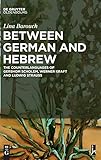Between German and Hebrew : The Counterlanguages of Gershom Scholem, Werner Kraft and Ludwig Strauss / Lina Barouch.
Material type: TextPublisher: München ; Wien : De Gruyter Oldenbourg, [2016]Copyright date: ©2016Description: 1 online resource (XII, 195 p.)Content type:
TextPublisher: München ; Wien : De Gruyter Oldenbourg, [2016]Copyright date: ©2016Description: 1 online resource (XII, 195 p.)Content type: - 9783110464146
- 9783110464504
- 9783110466614
- 830.9 23
- PT1109.J4 B37 2016
- online - DeGruyter
| Item type | Current library | Call number | URL | Status | Notes | Barcode | |
|---|---|---|---|---|---|---|---|
 eBook
eBook
|
Biblioteca "Angelicum" Pont. Univ. S.Tommaso d'Aquino Nuvola online | online - DeGruyter (Browse shelf(Opens below)) | Online access | Not for loan (Accesso limitato) | Accesso per gli utenti autorizzati / Access for authorized users | (dgr)9783110466614 |
Browsing Biblioteca "Angelicum" Pont. Univ. S.Tommaso d'Aquino shelves, Shelving location: Nuvola online Close shelf browser (Hides shelf browser)
Frontmatter -- Acknowledgements -- Table of Contents -- Note on Transliteration -- Abbreviations of Selected Primary Sources -- Introduction -- I. Gershom Scholem: Language between Lamentation and Retaliation -- II. Werner Kraft: “Singing a Lost World” -- III. Ludwig Strauss: Polyglot Dialogue and Parody -- Conclusion: The Eyes and Ears of Language -- Appendices -- Bibliography -- Index
restricted access online access with authorization star
http://purl.org/coar/access_right/c_16ec
This book traces the German-Hebrew contact zones in which Gershom Scholem, Werner Kraft and Ludwig Strauss lived and produced their creative work in early twentieth-century Germany and later in British Mandate Palestine after their voluntary or forced migration in the 1920s and 1930s. Set in shifting historical contexts and literary debates – the notion of the German vernacular nation, Hebraism and Jewish Revival in Weimar Germany, the crisis of language in modernist literature, and the fledgling multilingual communities in Jerusalem, the writings of Scholem, Kraft and Strauss emerge as unique forms of counterlanguage. The three chapters of the book are dedicated to Scholem’s Hebraist lamentation, Kraft’s Germanist steadfastness and Strauss’s polyglot dialogue, respectively. The examination of their correspondences, diaries, scholarship and literary oeuvres demonstrates how counteractive writing practices helped confront concrete and metaphorical crises of language to produce compelling alternatives to literary silence, amnesia or paralysis that were prompted by cultural marginality and dislocation.
Mode of access: Internet via World Wide Web.
In English.
Description based on online resource; title from PDF title page (publisher's Web site, viewed 23. Jul 2020)









